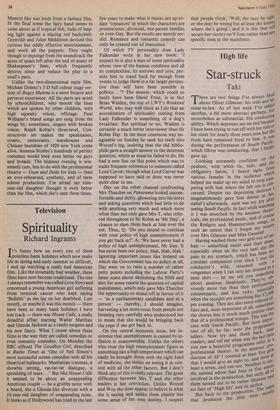Television
Spirituality
Richard Ingrams
TVs funny how on every one of these 1pointless bank holidays which now make life in spring and early summer so difficult, I end up watching a really bad American film. Like the invariably bad weather, these films have now become traditional. The one I always remember was called Love Story and concerned a young American girl suffering from terminal cancer who kept saying 'Bullshit' as she lay on her deathbed. Last month, or maybe it was this month — there have been so many bank holidays I have lost track — there was House Calls, a really dreadful affair starring Walter Matthau and Glenda Jackson as a randy surgeon and his new fancy. What I resent about these films is the way they are called comedies or even romantic comedies. On Monday the BBC offered The Goodbye Girl, described in Radio Times as 'One of Neil Simon's most successful screen comedies with all his theatrical hallmarks: Manhattan traumas, a showbiz setting, rat-tat-tat dialogue, a sprinkling of tears...' But like House Calls it seemed to be about an unappealing American couple — he a grubby actor with a beard, she a Glenda-like divorcee with a 10-year-old daughter of unappealing mien. It looks as if Hollywood has tried in the last
few years to make what it thinks are up-to- date 'romances' in which the characters are promiscuous, divorced, one-parent families or even Gay. But the results are merely sor- did. Romance and romantic comedy can only be created out of innocence.
Of which TV personality does Lady Falkender write in her new book: 'I suspect he is also a man of some spirituality whose view of the human condition and all its complexities, its sorrows and joys, per- mits him to stand back far enough from events to judge them in a far larger perspec- tive than will have been possible in politics ...'? The answer, which could so
easily have been David Frost, is in fact Brian Walden, the star of LWT's Weekend World, who may well think as I do that an
accreditation of spirituality coming from Lady Falkender is something of a dog's breakfast. But spiritual or no, Walden is certainly a much better interviewer than Sir Robin Day. In the most courteous way im- aginable on Sunday he sank his teeth into Worzel's leg, insisting that the old biblio- phile gave a straight answer to the deterrent question, which as usual he failed to do. He had a new line on this point which was to make frequent references to someone called Lord Carver; though what Lord Carver was supposed to have said or done was never quite clear to me.
Day on the other channel confronting
Mrs Thatcher on Panorama looked uncom-
fortable and shifty, glowering into his notes and asking questions which had little to do with anything very much and which more often than not only gave Mrs T, who refer- red throughout to Sir Robin as `Mr Day', a chance to slam them back at him over the net. Thus, Q: `Do you intend to continue with your policy of high unemployment if you get back in?' A: 'We have never had a policy of high unemployment, Mr Day. It has never been our policy, blah, blah, blah.'
Ignoring important issues like Ireland on which the Government has no policy at all, Day went on to raise a number of rather petty points including the Labour Party's latest scare about abolishing the NHS and also for some reason the question of capital punishment, which only gave Mrs Thatcher the opportunity to sound off in favour of it — 'as a parliamentary candidate and as a person' — thereby, I should imagine, harvesting a lot more votes from people not listening very carefully who understood her to mean that she would be bringing back the rope if she got back in.
On the central economic issue, her in- sistence that unemployment is caused by in- flation is unanswerable. Unlike the others who treat the high unemployment figure as something like a high temperature which can easily be brought down with the right kind of medicine, she insists on seeing it in con- text with all the other factors. But I don't think any of this is really relevant. The great difference between Mrs T and the other leaders is her conviction. Unlike Worzel and Woy she does appear to believe in what she is saying and unlike them plainly has some sense of her own destiny. I suspect that people think, 'Well, she may be right or she may be wrong but at least she knows where she's going'; and it is this that will secure her victory on 9 June rather than an)/ specific item in the manifesto.














































 Previous page
Previous page